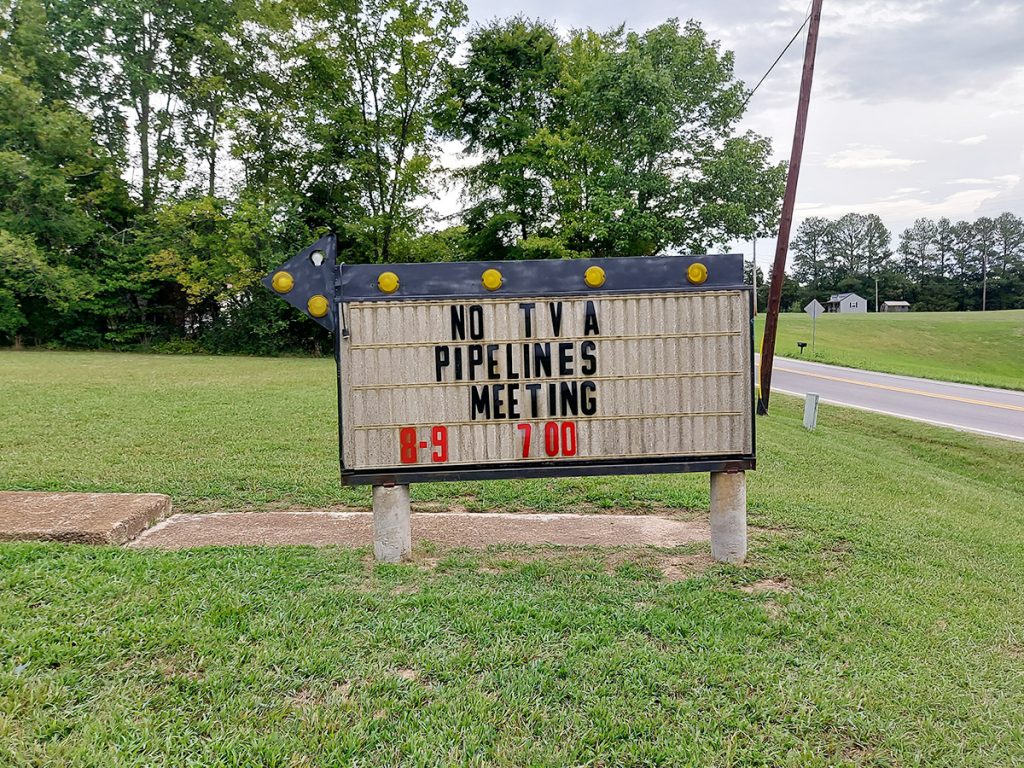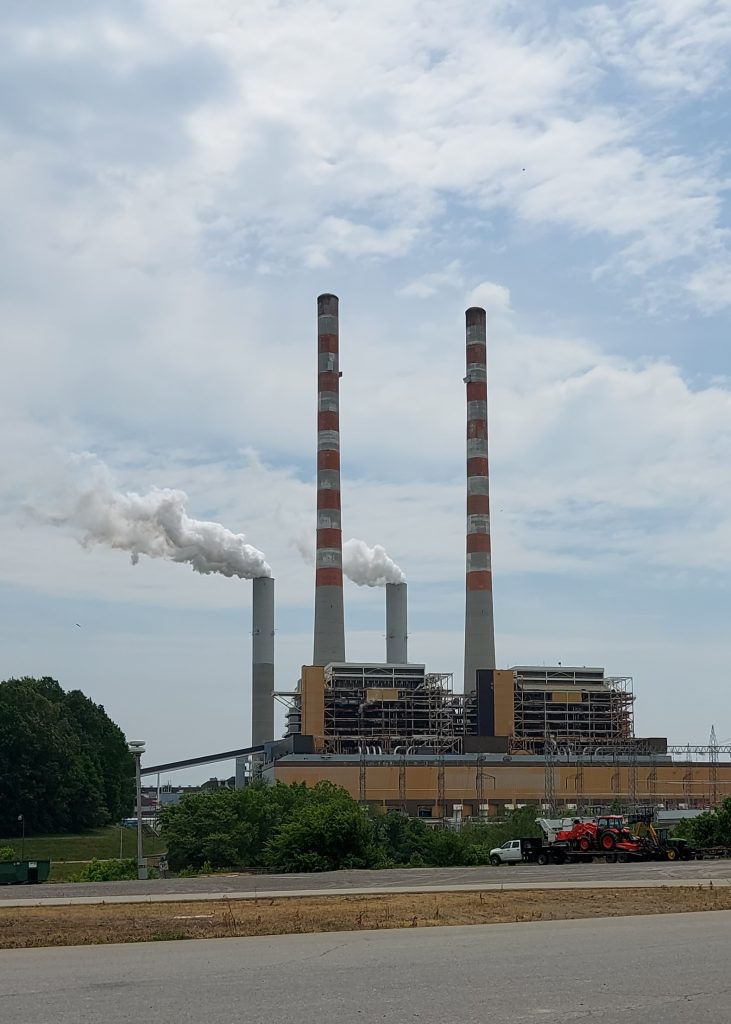Lorelei Goff | May 12, 2024 | No Comments

A sign stands outside the Jackson’s Chapel Community Center in Charlotte, Tenn., where a community meeting was held to voice concerns over a proposed methane pipeline in August 2022. Photo by Angie Mummaw
In Middle Tennessee, proposals to replace aging coal plants with methane-fired gas plants and pipelines are causing concerns about water quality and explosion risks.
The Tennessee Valley Authority, the nation’s largest federally run utility, and Tennessee Gas Pipeline Company, a subsidiary of gas giant Kinder Morgan, are pushing ahead with plans for the Cumberland Pipeline, a new project that’s part of a massive proposed build-out of fracked gas.
The 32-mile-long, 30-inch-diameter pipeline would carry pressurized methane — a highly explosive and climate-warming gas — through Dickson, Houston and Stewart counties in Tennessee.
The pipeline would connect existing gas infrastructure in southern Dickson County, where a pipeline exploded in 1992, to a proposed gas plant in Cumberland City at the current site of the Cumberland Fossil Plant.

The proposed 32-mile-long, 30-inch-diameter Cumberland Pipeline would carry pressurized methane — known to be a highly explosive and climate-warming gas — through Dickson, Houston and Stewart counties in Tennessee. Map courtesy of Southern Environmental Law Center
The 50-year-old Cumberland plant, one of the largest and dirtiest operated by the TVA, shut down during frigid weather from Winter Storm Elliot in December 2022 — along with multiple coal and methane gas plants throughout the region. Those coal and methane gas failures led TVA to implement rolling blackouts.
TVA intends to replace one of the Cumberland plant’s coal generators with a 1,450-megawatt combined cycle methane-gas plant slated for operation by 2026. In May 2023, TVA announced plans to partially replace the lost generation from the second coal-burning unit with another gas plant and pipeline in Cheatham County. They have not yet announced how they plan to make up the remaining lost generation.
Meanwhile, two lawsuits from environmental organizations to stop the pipeline and power plant are moving forward, as residents and environmental groups raise the alarm over potential safety hazards to people, property and the environment.
The Southern Environmental Law Center and Appalachian Mountain Advocates, on behalf of Sierra Club and Appalachian Voices, the organization that publishes The Appalachian Voice, are challenging a state permit for the Cumberland Pipeline, alleging state officials from the Tennessee Department of Environment and Conservation ignored the significant impacts it will have on the Harpeth River and Cumberland River watersheds.
The Southern Environmental Law Center is also representing Appalachian Voices and Sierra Club, along with the Center for Biological Diversity, in a lawsuit against TVA over the proposed Cumberland Plant, alleging the utility committed to building the plant before fully evaluating its environmental and climate impacts. Both lawsuits are currently pending in
federal court.
“The decision to replace coal with another fossil fuel will have devastating impacts on our region,” said Bri Knisley, director of public power campaigns for Appalachian Voices.
The pipeline project undermines federal climate goals, including the national goal for a carbon-free energy sector by 2035.
The pipeline would also threaten seven wetlands and cross streams more than 155 times, including a stream that is home to a potential new species of crayfish. The streams include tributaries of the Harpeth River, which is a popular outdoor recreation destination as well as a source of drinking water for the Nashville, Tennessee, area. Its construction would impact over 5,000 linear feet of streams and require temporary water withdrawals from eight streams and one reservoir.
A decision by the U.S. Army Corps of Engineers on whether to issue a 404 water permit for the pipeline is pending. Section 404 of the Clean Water Act regulates the discharge of dredged or fill material into waters of the United States.
Physical alterations to waterways in Tennessee also require an Aquatic Resource Alteration Permit. The Tennessee Department of Environment and Conservation held a public hearing in March concerning a request by Tennessee Gas Company to amend its permit to include additional stream crossings. TDEC has proposed to waive its authority under the Clean Water Act to certify that these additional impacts will not result in a violation of state water quality standards.
In a petition, Appalachian Voices urged TDEC to deny the permit because the company plans to use explosives and the open-trench method to cross waterways. Both would have major environmental consequences.
In addition, the cost of constructing new gas plants and pipelines could result in rate hikes for customers. TVA has already raised rates once to fund its gas spending spree.

A proposed methane-fired gas plant and 30-inch, 32-mile-long methane pipeline is causing concerns about water quality and explosion risks. The methane plant would replace one of the coal-powered generators at the Cumberland City Fossil Coal Plant. Photo by Angie Mummaw
In 1992, a pipeline explosion in Dickson County injured five people, destroyed three homes, and burned 400 acres of farmland.
Richard Honeycutt was a firefighter with the Charlotte Volunteer Fire Department at the time. He said metal fatigue contributed to the explosion.
“It released gas until [it reached] an ignition source, and it got so hot that it burnt the tar out of the asphalt,” Honeycutt says. “The road, instead of being blacktop, was white.”
His department was unable to get close enough to the homes to fight the fires due to the intense heat.
“It was so bad that it dried up a pond across the road from where it blew up,” he says.
The proposed Cumberland Pipeline route follows TVA right-of-ways, placing pipes beneath high-voltage power lines.
Bob Baird and his wife live in the impact zone of the pipeline, meaning they’re so close that their home would likely be destroyed if an explosion were to occur.
“We lived close to high tension wires at a previous location and we had a garden underneath it,” says Baird, who believes the decades-old environmental study for the right-of-way didn’t account for the installation of a pipeline. “We used to get shocked multiple times when we’d be out there picking our fruit or vegetables.”
Honeycutt also believes the power lines increase the likelihood of an explosion.
Residents along the route have expressed concern about construction damaging springs and creeks. In response to a request from one resident for baseline water testing, TDEC said it could not because of inadequate staff.
Appalachian Voices plans to test this resident’s water using money donated by the Tri-County Preservaion Group, a nonprofit that formed to help fight the pipeline and future issues the community may face.
Tri-County Preservation Group, previously known as Cumberland Preservation Group, formed in December 2022 to fight the Cumberland methane plant and pipeline.

Tri-County Preservation Group, previously known as Cumberland Pres- ervation Group, formed in December 2022 to fight the Cumberland methane plant and pipeline.
The group’s formation was prompted by an emergency meeting, attended by over 50 local residents, in July 2022 at the Cumberland Furnace Community Center.
The community group still holds monthly meetings. With continued support from Appalachian Voices and Sierra Club, the Tri-County Preservation Group has continued to grow its base, develop strategy and increase awareness about the proposed gas buildout.
According to Honeycutt, Dickson County lacks adequate water infrastructure to handle a pipeline explosion. “There’s very little water supply where a lot of that pipeline is gonna go,” Honeycutt says. “The water mains, they’re all really small. They’re overused. We’ve had exponential growth here in our county, and the water supply is dismal.”
According to Bob Baird, TVA has ignored the fears of residents near the pipeline route.
“They’ve talked with and contacted the people that have property that’s going to be affected directly by digging in their dirt, but for those of us that are out here in the explosion zone, they’ve just ignored us,” Baird says.
The pipeline also puts undue strain on the local first responders, according to Honeycutt. Volunteer departments are typically understaffed and underfunded. Honeycutt, now retired from his department, explains that the annual budget didn’t cover much more than the fees for mandatory equipment testing.
Volunteer departments also face challenges to getting adequate training for special hazards like pipeline explosions. Most training is offered during the week when volunteers are working
their regular jobs.
“I would suggest that if they put the pipeline through our area, they need to fund a full-time firefighter for every fire department that pipeline goes through,” Honeycutt says. “Not only would that help with the increase in probability of an incident with the pipeline, but also it helps the entire area with reduced response times. It would also provide first responders for medical emergencies as well, because we have a lot of rural areas where it’s a long wait for an ambulance to get there.”
The pipeline would run right by the Claylick Volunteer Fire Department, Honeycutt points out, which would likely be destroyed in the event of an explosion in that area. That could cost lives as well as destroy the building, along with the trucks and equipment housed inside.
Honeycutt predicts the potential for a disaster will increase over time.
“From now on for future generations, it’s always gonna be there,” he says. “And the longer it’s there, the more likely it is that an incident is going to happen.”
Like this content? Subscribe to The Voice email digests